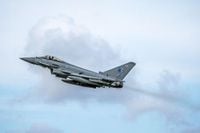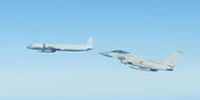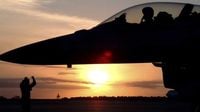In a significant display of military readiness, Royal Air Force (RAF) fighter jets were scrambled twice in less than 48 hours to defend NATO airspace from Russian aircraft, marking a pivotal moment in the ongoing tensions between the West and Russia. This operation underscores the increasing aggressiveness of Russian military activities in the region and highlights the UK's commitment to NATO amidst rising security threats.
The RAF's involvement comes under the newly established Operation Chessman, aimed at bolstering Europe's air defense capabilities. On April 15, 2025, two British Typhoon fighter jets stationed at the Malbork airbase in Poland were deployed to intercept a Russian reconnaissance aircraft over the Baltic Sea. Just a day and a half later, another pair of Typhoons were dispatched to respond to an unidentified aircraft that had taken off from Russia’s heavily militarized Kaliningrad region, situated between Poland and Lithuania.
UK Armed Forces Minister Luke Pollard emphasized the unwavering commitment of the United Kingdom to NATO, stating, "With Russian aggression growing and security threats on the rise, we are stepping up to reassure our allies, deter adversaries and protect our national security through our plan for change." This statement reflects the UK government's strategic positioning in response to perceived threats from Russia.
The RAF jets, part of a six-jet fleet, were only deployed to Poland three weeks ago as part of a joint defense operation with the Swedish Air Force. Wing Commander Christopher Jacob stated that the aircraft were ready to "defend and deter, standing ready to protect against any threat." This proactive stance is indicative of the heightened military readiness that NATO allies are adopting in light of the ongoing geopolitical climate.
The recent interceptions are not isolated incidents. Since Russia's full-scale invasion of Ukraine in 2022, Russian military aircraft have routinely tested NATO's air defenses. For instance, in November 2022, British Typhoons intercepted a Russian bomber over the North Sea, while in February 2025, Norwegian F-35 jets were scrambled to intercept two Russian bombers and their escorts in the Arctic.
The backdrop to these military maneuvers is the faltering ceasefire negotiations between the United States and Russia regarding the conflict in Ukraine. US President Donald Trump has expressed frustration with the pace of negotiations, suggesting that the US may withdraw from talks if progress is not made swiftly. Secretary of State Marco Rubio echoed this sentiment, stating, "We need to determine very quickly now — and I’m talking about a matter of days — whether or not this is doable." The urgency in Washington reflects a broader concern about the implications of continued Russian aggression.
Moreover, on April 19, 2025, President Vladimir Putin announced a temporary 30-hour "Easter truce," ordering Russian troops to halt military operations. However, this pause has been met with skepticism, as Russian strikes on civilian areas have persisted since the rejection of a US-backed ceasefire proposal, which was accepted by Kyiv.
In light of these developments, European leaders are bracing for the possibility of a peace deal, with a “coalition of the willing” led by the UK preparing to deploy peacekeeping forces to Ukraine if a ceasefire is achieved. British Prime Minister Sir Keir Starmer is advocating for the US to act as a security guarantor for this plan, ensuring a robust response in the event of renewed Russian aggression.
The recent RAF operations highlight the delicate balance of power in Europe and the strategic importance of NATO's collective defense commitments. As tensions continue to escalate, the actions of NATO members, particularly the UK, will play a crucial role in shaping the future of European security.
In conclusion, the RAF's rapid response to Russian incursions into NATO airspace serves as a stark reminder of the ongoing geopolitical tensions and the necessity for military readiness among allied nations. As the situation in Ukraine remains precarious, the commitment of NATO members to collective defense will be tested in the coming weeks and months.






